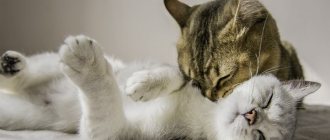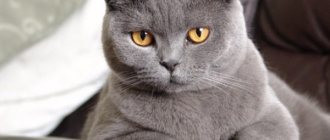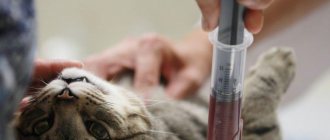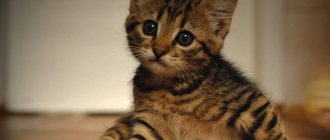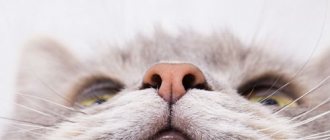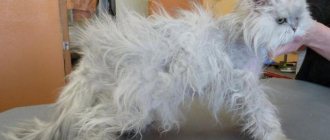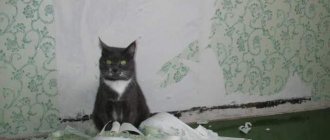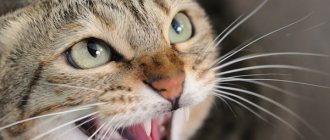7122Administration
A pet's illness is always scary, and it is not known who is more worried - the animal itself or its owner. But not all cat owners notice such a small, at first glance, problem as whisker breakage. Sometimes this is not just a physiological feature, but a signal of internal disorders. It is especially important to establish the reason why a kitten’s whiskers are breaking - the baby has just come into this world, but, quite possibly, something is already wrong with him. However, precaution is also important here - in some cases the whiskers break on their own, and there is no need to take the cat to the veterinarian. The question arises - how to determine when to worry?
Natural causes
It's not all bad for owners of furry purrs.
It’s worth mentioning right away that in some situations and for a number of breeds, whisker breaking is a normal situation. What are the reasons for the described phenomenon? Vibrissae (as cat whiskers are called in the scientific community!) are coarse hairs that need renewal. They make it easy to navigate in space even in pitch darkness. With their help, the pet determines the temperature of the food and its origin. The process of whisker loss is as natural as, for example, cats shedding hair or gaining fat for the winter.
What should the owner do? First of all, don't worry. Wait a few days and if the cat is planning to form new whiskers, then you don’t have to worry. They will soon grow back successfully. If the situation is the opposite and after an impressive period of time new whiskers do not grow or they simply do not exist, then you should consult a veterinarian.
There are entire breeds that lack whiskers. There are several main reasons for this.
- In the first place are the sphinxes, as well as their hybrid breeds: bambino, greyhound, elves, etc. Moreover, the percentage of individuals without mustaches is not so large, but they feel great. Some cats exhibit small whiskers. As for Sphynx animals. Under no circumstances should you trim even the smallest mustache. If they fall out, this is, for the most part, a reason to consult a veterinarian.
- Kittens' whiskers break off due to curiosity. The baby can stick his head into a narrow hole, get out unsuccessfully and lose part of the whiskers. Sometimes, the cat deliberately bites them off entirely. In any case, they will grow back and there is no need to worry. This is natural, although sometimes cruel, behavior of animals.
- In the struggle of males for a lady or territory, fights often occur. In the heat of battle, not only the loser, but also the winner can lose their mustache.
There is an opinion (not confirmed by scientific data!) that the breaking of a mustache by an alpha male is a sign of dominance and total submission. A defeated cat completely loses its sphere of influence, territory, and female. If the losing cat lives in a private house, then the winner can visit the loser and take away the food.
In any case, the reasons described are a natural process for cats’ whiskers to fall out or break off. After some time they will grow back, perhaps even more magnificently than before.
As the kitten grows, its whiskers may break. This is due to hormonal changes in the body. It can be compared to the growth of a beard and mustache in people during adolescence.
What is the reason?
Short whiskers on a cat are not always a reason to panic, because quite often this is a natural process established by nature, when, during the renewal period, the old whiskers fall off, and strong new ones grow in their place. Most often you can observe that the whiskers have fallen off in a breed of cat such as the Sphynx. Moreover, some types of hairless cats do not have whiskers at all from birth. But the Maine Coon, on the contrary, has a mustache that is a great asset, since its length can reach 18 cm. But broken whiskers in a kitten and an adult pet are not always considered the norm. There are several reasons for increased fragility and loss of vibrissae:
- Fungus. A mycotic infection inside the cat's body, leading to fragility of the tactile organ.
- Poor quality food. If there is insufficient supply of nutrients, the cat’s body weakens.
- Helminths. The presence of worms entails a deterioration in the condition of the pet's whiskers and overall health.
- Dry air. If the room where the animal lives has low humidity and the air is dry, the whiskers will fall out until the microclimate normalizes.
- Frequent bathing. A small part of cats like to be in the water, so for the rest it is stressful, as a result of which their antennae also begin to fall off.
- Skin parasites. Fleas and lice, which chew through the organ of touch at the very base, cause enormous damage to the cat’s body.
Often this phenomenon is caused by the actions of other pets living in the house.
If a cat's whiskers have fallen off on one side, then it is likely that this could not have happened without outside “help.” For example, other pets break a kitten’s whiskers, showing their superiority, or small children, showing interest in the protruding parts of the animal’s body, pull its whiskers. Broken vibrators in small cats can also be caused by the mother cat, who in this way makes it clear who is in charge in the house.
Is losing a mustache normal or nonsense?
Losing whiskers in cats is a common phenomenon: new ones grow in place of old ones. The change of coarse hairs on the muzzle accompanies seasonal molting and should not cause concern. Anyway, before you panic - “The cat’s whiskers are falling out - what should I do?” - It is worth examining the separated hairs.
The bulb at the base will indicate the end of the natural cycle of vibrissa development. A beveled tip is evidence of thinning and weakening of the animal’s coat.
You need to worry if the whiskers are severely broken and are rapidly leaving the pet’s face. To prevent complete baldness, you should visit a veterinarian and find out why your cat’s whiskers are falling off or deformed.
- genetic predisposition (sharp examples are sphinxes, which nature has endowed with such soft hairs that they constantly break and curl, or Cornish rexes with thin and unruly vibrissae-webs);
- serious internal disease associated with metabolic disorders;
- the presence of parasites (fungal infection, worms, lichen, ticks);
- a lack of keratin, the main structural component of hair, is a common reason why a cat’s whiskers break;
- feline curiosity, forcing the home “researcher” to singe the fur on the flame of a candle or the fire of a switched on stove;
- human prejudices (a cat's whisker is believed to bring good luck);
- the result of a child’s prank who decided to shave his four-legged friend;
- fun of a kitten with brothers and sisters or maternal care;
- “battle losses” in fights of an adult alpha male.
We suggest you read: The calf is not eating well, what to do, why the calf does not eat hay, reasons.
Most often, whisker loss is not associated with any abnormalities. Regardless of the molting period, they can be periodically renewed - old vibrissae fall out, and new ones appear in their place. The reason why a cat's whiskers fall out can be a fight with another animal or excessive curiosity, in which he comes too close to a burning fire.
Mustache care
There are no special mustache care procedures. The place where they fall out or break does not need to be processed, as well as any other procedures. However, there are a number of manipulations that definitely should not be done.
Do not pull out, break or trim your mustache. Even if there is a suspicion that they are too long or the cat is uncomfortable walking with them, removing the whiskers and violating their integrity is prohibited. In addition, the rule that if you trim the whiskers, they will grow longer in the future - this is fundamentally wrong.
The loss of 1-2 antennae is not dangerous for a kitten and is natural. In other cases, you should take a careful look at the animal and try to find the reason for the massive loss of its senses of touch. If there are accompanying symptoms, as well as suspicions of the presence of disease or parasites, you should consult a veterinarian. An examination and tests will help identify the cause of the loss or deterioration of the kitten’s whiskers.
A pet's illness is always scary, and it is not known who is more worried - the animal itself or its owner. But not all cat owners notice such a small, at first glance, problem as whisker breakage. Sometimes this is not just a physiological feature, but a signal of internal disorders. It is especially important to establish the reason why a kitten’s whiskers are breaking - the baby has just come into this world, but, quite possibly, something is already wrong with him. However, precaution is also important here - in some cases the whiskers break on their own, and there is no need to take the cat to the veterinarian. The question arises - how to determine when to worry?
Diseases
But before moving on to specific ailments, let's consider several other reasons. Whiskers fall out or break when indoor humidity is low. This happens especially often in winter when the heating is turned on.
Problems are also possible in extreme heat, for example, in summer, starting at the end of May. Fortunately, if your pet’s immunity is strong, if you make preventive visits to the veterinarian, including a balanced diet, then whisker breakage can be avoided in 90% of cases.
Frequent bathing (as soon as the poor thing can stand it!), low-quality detergents, even regular soap with any additives - all lead to weakening of coarse hair. In extreme cases, they partially fall out.
In general, it is worth paying special attention to proper nutrition and water. The mustache gradually loses its elasticity and when jumping on a high cabinet or falling, it is extremely easy to break it. As for nutrition. The abundance of additives, especially in the cheap food segment, does not always have a beneficial effect on the pet. As a rule, when creating a diet, the cheapest products from recycled materials are used. But that's not scary.
Of course, manufacturers take into account the balance of vitamins and minerals, but adjusted for cost, it is not always optimal. Moreover, the additives accumulate over a long period of time, which makes it impossible to immediately recognize the disease. The mustache breaks off gradually, sometimes one at a time or in pairs. But even a minor loss leads to disorientation in space and problems in communicating with fellow humans.
Not everything is so simple with natural products. Even farm chicken raised on feed of dubious origin contains unpleasant additives. Interestingly, some breeders remove the skin from their feathered food. This is more of a reinsurance because the majority of unfavorable additives are contained in meat.
Milk, in principle, is not desirable for cats. In addition, modern store packaging contains certain stimulants and preservatives. This is not so bad, but with prolonged use it has a negative effect on the cat’s body.
Likewise, fermented milk products. Unfortunately, for a balanced diet you cannot do without them. Kefir, fermented baked milk, etc. But not all owners have the opportunity to pamper their cat with natural, country-made products.
With water everything is a little easier. It is enough that the pet has free access to the bowl. It is advisable to change the water several times a day.
The result is food allergies or vitamin deficiency. Hair loss and discharge from the nose and eyes are often accompanied by hair loss or breaking off. Among the specialized diseases, we note hypothyroidism - problems in the functioning of the thyroid gland. Excess or lack of weight also affects the breaking off of the mustache.
Let's focus on pathogenic microorganisms and fungal infections. One of the most common causes of mustache loss.
Fungal infections affect areas of the skin, preventing the normal growth of not only hair, but also mustache. But the worst thing is completely different. Growth does not stop completely, but instead of whiskers, purulent follicles form, which cause severe pain to the cat.
We invite you to read: Otitis media in cats – for what reason does otitis media develop in cats? Fungal otitis or otomycosis in cats: causes, symptoms, treatment
Main reasons
Each of the mustaches is an independent organ of touch, transmitting information to the cerebral cortex. In the process of their vibration, as well as from contact with objects, the animal receives information about their location, ambient temperature, and also about its position. Therefore, if a kitten’s whiskers break off, it becomes defenseless in front of the outside world.
Why did the cat's whiskers break off?
Adult animals are characterized by partial replacement of whiskers, when old ones fall out and new ones grow in their place. If the cat notices active loss of whiskers or they visually become smaller, the owner should pay attention and find a possible cause. Such a symptom can either have a trivial cause or indicate serious health problems.
External factors for mustache loss include:
- Low air humidity. This problem occurs during the heating period.
- Frequent bathing of the animal, as well as the use of poor quality shampoos.
- Hormonal imbalances in adolescence.
- Lack of water. Refusal to drink or excessive absorption of liquid is a reason to consult a veterinarian. Loss of antennae in this case is a harmless symptom of dangerous diseases.
Cat's lost whiskers
Internal factors include the following:
- Poor nutrition. At the same time, whiskers can fall off both with natural nutrition and with feeding with industrial compounds. In the first case, the cause is surrogate products, as well as meat undergoing chemical processing. In the second case, cheap food, consisting of large amounts of beans, dyes, chemical salts and other dangerous substances, is most often to blame.
- Allergy. If you have an individual intolerance to certain components, the coat may deteriorate, the claws may peel off, and the mustache may fall out and break off. Redness of the eyes and development of dermatitis are also possible.
- Lack of vitamins. The development of vitamin deficiency is reflected in the quality of coat, eyebrows and mustache. If an animal does not receive the required amount of microelements and vitamins from food, it is necessary to additionally introduce vitamin supplements into the diet.
- Lack of microelements. Often the mustache can break due to a lack of potassium, magnesium, phosphorus and calcium. All these elements are useful in combination, otherwise mustache loss is a possible minimum. The main reason may be the development of urolithiasis and hypocalcemia.
- Hormonal disorders. Too much or too little hormones can lead to a variety of problems. But first of all, the fur and whiskers suffer. Overweight is common.
- Presence of parasites. Fleas and ticks can lead to allergic reactions, as well as a decrease in the cat's immunity, which negatively affects the condition of the coat and whiskers. Whip eaters are able to gnaw the vibrissae at their base.
- Fungal diseases. Under the influence of the fungus, the hair follicles become clogged, crusts and growths form on the skin. Vibrissae may grow into the skin or not grow at all.
It is important to strictly observe the dosage of vitamin complexes, since an excess of vitamins is no less harmful than their deficiency.
Loss of whiskers in a kitten
The answer to why kittens' whiskers break off most often lies in age-related changes. After falling out, young thin vibrissae are replaced by thick adult ones.
Lice eaters in cats.
However, a kitten’s teeth do not always break for this reason; there are also psychological factors:
- Animals can break off each other's whiskers, thus showing their superiority.
- A mother cat may chew off the whiskers of an older kitten if they are not separated for a long time.
- Sometimes children can burn or cut off the whiskers. It is necessary to explain how to behave with an animal from childhood.
Depending on the breed
If it is not clear why the kitten's whiskers broke off, you should take into account its breed. So some cats, by their nature, have a greater tendency to lose or even have no whiskers. This applies to all sphinxes: Don, Petersburg, Canadian, and their hybrids: Elves, Bambino and others.
Prevention
What to do if an unpleasant situation occurs? It is impossible to help a pet at home. Veterinarian consultation required. The doctor will examine the animal, take tests and, based on the results, prescribe a course of treatment.
In most cases, mustache loss is a sign of other serious diseases. Let us note the main methods of treatment for different diagnoses:
- Parasites - anthelmintics (tablets for worms) and other antiparasitic drugs are prescribed.
- Allergies - antihistamines.
- Infections - antibiotics.
- Avitaminosis - a course of essential minerals and substances (fatty acids, biotin, taurine, etc.). The main thing when taking it is to strictly follow the dosages prescribed by the veterinarian. Otherwise, the situation will worsen.
At home, as mentioned above, it is better to adhere to a balanced diet, avoid low humidity, and carry out a preventive course of treatment for worms and parasites. A prerequisite is the presence of a sufficient amount of water, especially when feeding dry food. Preferably starting from the middle price range.
Ultimately, a cat's whiskers are not just for beauty. They perform an important tactile function, helping to navigate a new environment or find a common language with representatives of the opposite sex.
In order to avoid trouble with your pet’s whiskers from a young age, you need to follow just a few rules and be careful. The animal must be fed well-balanced food of good quality. It is extremely important that the growing body receives everything it needs for healthy development.
It is necessary to provide the kitten with protection from other pets, if there are any in the house. When he grows up, he will be able to stand up for himself, but at 2 months and even a little older, it is worth stopping attempts to clarify the relationship between animals.
To avoid various parasites, you need to maintain hygiene, wash the kitten promptly and regularly give deworming medications. Periodic visits to the veterinarian for preventive maintenance will allow you to learn about all health problems at the stage of their development and prevent the occurrence of complications.
Why does a cat need mustaches and eyebrows?
Why does a cat need whiskers? They are an important organ of touch. Many animals that feed on their mother's milk have similar adaptations.
The hardest and longest whiskers of a cat help the animal navigate in space. These hairs are located on the cheeks, on both sides of the nose, above the eyes, on the chin and tail.
Cat's whiskers also have another name that is not known to everyone. Scientifically, they are called vibrissae. Cats touch different objects with them to determine their size. For example, before climbing into a hole, a cat checks with whiskers whether it is of sufficient size.
The pet may not have them at all. Due to the nature of the breed, hairless cats may have broken whiskers, curled or not have them at all.
Sometimes the absence of vibrissae occurs in furry representatives of the cat family. This is due not only to the breed, but also to a kind of mutation.
As already mentioned, the whiskers of cats are located not only on the face, but also on the paws and tail. How many whiskers a cat has along the body depends on the breed and the specific representative.
The whiskers on the paws and tail are not so long; they can be distinguished by their greater rigidity. The number of rows of a cat's whiskers determines how well they navigate the world around them.
What are vibrissae?
These are special hard hairs that are an organ of touch. Each whisker has a different thickness and length, and therefore differs in the degree of sensitivity. The shortest ones are located on the chin, above the eyes and in the cheek area of the animal. The longest and most sensitive vibrissae are located directly above the upper lip.
Those who want to understand why a kitten's whiskers break will probably be interested to know that each animal has an average of twenty-four whiskers. Moreover, each of them comes into contact with numerous nerve endings. In addition, vibrissae are present between the cat's toe pads and in the ankle area. With their help, animals can analyze the surface on which their paws step and respond to changes in humidity levels.
How can an owner harm a pet?
Before deciding what to do to fix the problem, the owner must find out why the cat's whiskers are breaking. It is necessary to check all the conditions of keeping the animal: whether it consumes enough fluids, whether the air in the room is too dry, change the shampoo or bathe less often. It is necessary to check the pet for the presence of parasites, or carry out routine deworming if the last procedure was carried out more than 4 months ago.
We suggest you read: Red-eared slider does not eat - causes and treatment. Why doesn't the red-eared slider eat?
The cat or kitten must be examined for fungal infections: independently, or taken to a veterinarian. When these causes of whisker loss are excluded, you should pay attention to the pet’s nutrition. The cat's diet should contain foods containing vitamins, Omega-3 and Omega-6 fatty acids and minerals in balanced amounts. Calcium, magnesium, phosphorus, sodium and iodine must be present.
The purchased food may not meet the requirements, so your pet will need to take vitamin and mineral complexes.
Very often the owner himself is the cause of the animal’s poor health. He provokes this by performing the following actions:
- Mustache plucking.
- Shortening of the vibrissae.
- Trimming your mustache to make it grow faster and thicker.
Such actions can damage the animal's mental state. The cat will have difficulty oriented in space, sleep restlessly, limp, and experience discomfort. A cat's whiskers are removed only if prescribed by a veterinarian. A common reason that forces the use of this measure is ingrown mustaches into the skin or fungal infections.
Some causes of mustache breakage
The reasons can be very diverse. Here are some of them .
Dry air in the apartment. When the air in the house is too dry, especially in the winter season when there are a lot of heating devices, this can cause the cat's whiskers to break. Unfortunately, not a single cat is immune from this; you just need to try to help it.
© shutterstock
Frequent bathing and poor-quality shampoos. Excessive water procedures, especially with poor quality cosmetics, leads to seborrhea, a painful skin condition. This can also cause the mustache to break off and even fall out.
Adolescence in a cat provokes a temporary metabolic disorder, as a result of which the whiskers can also break.
What happens if you cut a cat's whiskers?
Some owners wonder whether it is possible to cut the whiskers. It happens that a small child or an unaware adult trims the pet's whiskers. Of course, this is not fatal.
Cats' hairs renew themselves every few months, and after some time the hairs will grow back. However, at first the pet’s behavior becomes inappropriate.
In other words, a pet with cut off whiskers is capable of harming itself. Coarse hairs can break off on their own. Important points to remember:
- You cannot trim a cat's whiskers. The help of the whiskers is invaluable for the animal.
- Although the whiskers grow back, time spent without them will affect the animal's mood. Stress and depression may occur, not to mention the numerous injuries he will inflict on himself.
As already mentioned, a trimmed mustache grows back. Lost, broken vibrissae are constantly renewed and grow again. But this does not mean that they need to be trimmed or straightened in order to grow better. A lost whisker will simply cause less harm to your pet.
How to protect your cat from losing his whiskers
The cat will have healthy and beautiful whiskers if you follow these rules:
- Periodically prevent the appearance of parasites on the skin and in the cat’s body using special means.
- Feed your cat according to his diet and diet.
- Pay attention to signs that indicate allergies. Eliminate the causes that caused it in a timely manner.
- Do not forget to vaccinate your animal against viral infections according to the schedule.
- Bring your pet to the veterinarian periodically for examination.
- Provide your cat with proper care and attention.
It is contraindicated to trim a cat's whiskers or pull them. Such actions not only cause discomfort, but can also lead to undesirable consequences. With proper care and following all recommendations, the cat's whiskers will not break, and after they fall out, new whiskers will grow.
How to warn?
When whiskers quickly break off, cats experience discomfort and nervousness, since one of the main functions for animals—the sense of touch—deteriorates. If there is a genetic factor, the whiskers will grow back on their own quite quickly, but if the reason for the loss of the tactile organ lies elsewhere, then it will take time, treatment and preventive measures to restore the growth and strength of the whiskers. Thus, in order to prevent subsequent shedding of the antennae in cats, you will need to monitor the hygiene of your pets, periodically treating them with products that have a detrimental effect on fleas and other pests.
The pet should stay in a room with optimal humidity and a regular flow of fresh air. It is important for cats to drink enough liquid, so they should always have a tray with clean water. Veterinarians recommend vaccinating cats against viral infections, carrying out helminth prophylaxis once every 3 months, as well as adjusting the diet depending on the age of the animal, and at the first sign of a pet’s health problems, do not self-medicate, but consult a specialist.
Why do cats' whiskers turn black or white?
The color of the whiskers directly depends on the color of the animal itself. They can be white, black, red or several colors at the same time. Usually a black cat has black whiskers, but sometimes white whiskers are normal. In some breeds they turn black over time.
If a cat with a white mustache has acquired a black color, this phenomenon also does not mean anything terrible, just a normal change in hair pigmentation. You should be wary if the color, on the contrary, changes to white. Sometimes this can be a symptom of a disease. Therefore, even with a slight deviation, it is worth consulting with a veterinarian.

